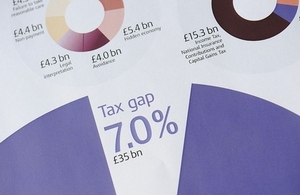2011 to 2012 tax gap figures published
Figures released by HMRC estimate the tax gap for 2011 to 2012 at 7% (£35 billion) of tax due, continuing a long-term downward trend.

Tax gap report
The tax gap has fallen steadily over the last six years, from 8.3% of tax due in 2005 to 2006 to 7.1% in 2010 to 2011 and 7% in 2011 to 2012. The tax gap is regularly revised to take account of improved methods and the latest available information, and the figures published today include revisions going back to 2005 to 2006. Alongside existing estimates of the beer and spirits tax gaps, a new estimate for the wine tax gap has been included for the first time.
The tax gap is compiled from around 30 separate estimates for different taxes and is broken down by type of tax, customer group and customer behaviours, including tax evasion and avoidance, customer error, the hidden economy, criminal attacks and where tax cannot be collected because businesses have become insolvent.
Exchequer Secretary David Gauke said:
These figures show the tax gap is continuing to fall. The vast majority of businesses and individuals pay the taxes they owe. But where they don’t it is for HMRC to challenge non-compliance fiercely, protecting money that would otherwise be lost.
Since 2010, the Government has invested nearly £1 billion in additional compliance initiatives over the Spending Review period. HMRC is on track to secure a further £44 billion in tax revenues over the next two years.
Edward Troup, HMRC’s Tax Assurance Commissioner and Second Permanent Secretary, said:
The range of non-compliance behaviours revealed by these tax gap figures underline why it is so important for HMRC to step up our wide-ranging activities against the minority who aren’t paying what’s due, whether they are SMEs, individuals, big business or organised criminals. This isn’t just critical for the nation’s finances: it’s also important to protect the vast majority of honest businesses and individuals from being cheated by the unscrupulous few.